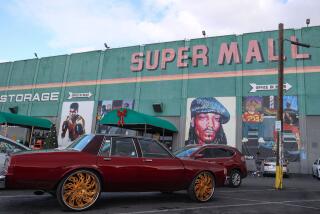Korean-Americans Lack Riot Assistance
- Share via
MID-WILSHIRE — Two surveys of Korean-American merchants whose businesses were damaged in the spring riots have found that financial and administrative difficulties continue to hamper rebuilding efforts.
The Korean-American Inter-Agency Council, a consortium of community groups organized to aid riot victims, last week released the results of a telephone survey of 322 of the more than 2,000 Korean-American merchants and their families whose businesses were destroyed or damaged in the riots.
A majority of the merchants in the council’s survey who applied for assistance from the Federal Emergency Management Agency and the U.S. Small Business Administration received aid, but red tape has delayed check distributions and, in some cases, the grace period for repayment of SBA loans--which ranges from five to 18 months--has expired, said Bong Hwan Kim, executive director of the Korean Youth & Community Center, the consortium’s lead agency.
Another survey of 150 Korean-American merchants by the Mid-Wilshire Neighborhood Opportunity Center, a federal office established by the Presidential Task Force on Los Angeles Recovery, showed that the average loss reported by merchants was $180,816. However, the average SBA recovery loan was $136,894, supplemented by an average of $6,636 from FEMA. The survey, taken by telephone and in person, found that 46 respondents lost more than $150,000, including 20 who lost more than $500,000.
Many SBA applications are still pending, said Howard Lee, director of the Mid-Wilshire center. He estimated that about 20% of the applicants would be denied loans because they lack sufficient collateral or otherwise fail to meet eligibility requirements.
Min Paek, executive director of the Korean-American Relief Fund, said most of the merchants she has talked to want to rebuild but lack financial and political support.
“They keep running into obstacles, like zoning changes, complicated licensing hearings and some opposition from community groups,” Paek said.
More than half the merchants in the interagency council survey reported that they were not insured and many said they need help with rent and mortgages, utility bills, medical care and other necessities.
Because a majority of the respondents reported difficulty with English, Korean-American community groups must be included as facilitators in the recovery process, Kim said.
The council will interview all 2,300 Korean-Americans listed as riot victims with various community groups and expand the case-management phase of its work by next month, Kim said.
The results of the survey will be used to buttress the council’s lobbying efforts for additional government and private sector assistance for the victims, he said.
More to Read
Sign up for Essential California
The most important California stories and recommendations in your inbox every morning.
You may occasionally receive promotional content from the Los Angeles Times.













